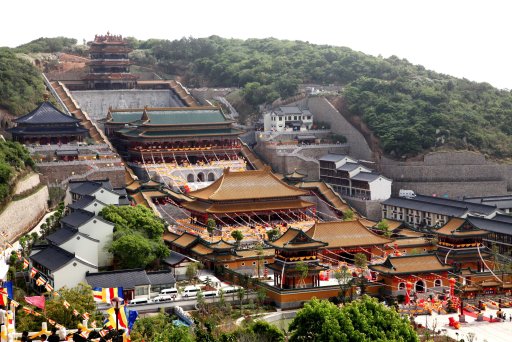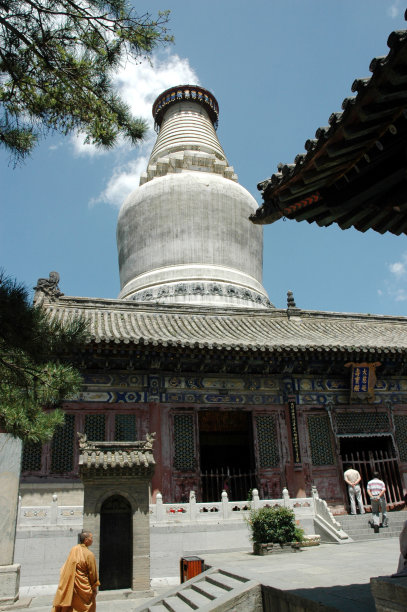Associated Press - In this photo taken June 18, 2006, worshippers attend a ceremony at the Jin Ding, or Golden Tip, on Emei Mountains in Emeishan city in southwest China's Sichuan province. Authorities announced Monday, Oct. 22, 2012, a ban on temples selling shares to investors after leaders of several temples planned to pursue stock market listings for them as commercial entities. (AP Photo) CHINA OUT
 |
| In this photo taken May 10, 2011, preparations take place to celebrate the completion of a new tower at the Baotuo Monastery in Putuo Mountains in Zhoushan city in east China's Zhejiang province. Authorities announced Monday, Oct. 22, 2012, a ban on temples selling shares to investors after leaders of several temples planned to pursue stock market listings for them as commercial entities. (AP Photo) CHINA OUT |
 |
| In this photo taken July 18, 2009, a monk walks as tourists visit Tayuan Temple in the scenic Wutai Mountains in Wutai county in north China's Shanxi province. Authorities announced Monday, Oct. 22, 2012, a ban on temples selling shares to investors after leaders of several temples planned to pursue stock market listings for them as commercial entities. (AP Photo) CHINA OUT |
BEIJING (AP) — China is telling tourist-favored Buddhist temples: Don't let money be your mantra.Authorities announced a ban this week on temples selling shares to investors after leaders of several popular temples planned to pursue stock market listings for them as commercial entities. Even the Shaolin Temple of kung fu movie fame was once rumored to be planning a stock marketdebut — and critics have slammed such plans as a step too far in China's already unrestrained commercial culture.
"Everywhere in China now is about developing the economy," complained Beijing resident Fu Runxing, a 40-year-old accountant who said he recently went to a temple where incense was priced at 300 yuan ($50) a stick.
"It's too excessive. It's looting," she said.
Centuries-old Buddhist pilgrimage sites Mount Wutai in Shanxi province, Mount Putuo in Zhejiang and Mount Jiuhua in Anhui all were moving toward listing on stock markets in recent months to finance expansions, according to state media.
The government's religious affairs office called on local authorities to ban profiteering related to religious activity and told them not to allow religious venues to be run as business ventures or listed as corporate assets.
Companies that manage temple sites may be able to bypass the prohibition on listing shares simply by excluding the temples themselves from their lists of assets. A Buddhist site at Mount Emei in Sichuan already has been on the Shenzhen stock exchange since 1997 but its listed assets include a hotel, cable car company and ticket booths — not the temples, which date back several hundred years. Shanghai lawyer Wang Yun said the new prohibition wouldn't likely affect Emei, but might make additional companies think twice before listing.
Turning religious sites into profit-making enterprises is certainly not limited to China, but it illustrates just how commercialized this communist country has become in the past couple of decades, with entrepreneurs seizing on every opportunity to make money. One businessman has started selling canned "fresh air" in polluted Beijing.
No one could have anticipated that the poor and egalitarian China of Mao Zedong's time would become a "Wild West" of commercialism, said Mary Bergstrom, founder of The Bergstrom Group, a marketing consultancy in Shanghai.
"There aren't the established checks and balances in China that exist in other countries ,so people are more willing and able to test the boundaries of what is acceptable, especially if the end result of these tests is potential profit," she said.
The Chinese government has strict controls on religion, with temples, churches and mosques run by state-controlled groups. Even so, religion is booming, along with tourism, giving some places a chance to cash in.
The ban on profiteering from religious activity is "just a reflection of the terrible reality of the over-commercialization in recent years of temples and other places," the Southern Metropolis Daily said in an editorial Wednesday. "People who have been to famous religious places should be familiar with expensive ticket prices and donations for all kinds of things."
Chinese entities from nature parks to religious sites are increasingly turning to commercial activities to pay expenses as government support dwindles in a society with little charitable giving. Temples face heavy costs to maintain centuries-old buildings and gardens.
But the State Administration for Religious Affairs says some local governments, businesses and individuals have built religious sites for profit, hired fake monks and tricked visitors into handing over money.
A notice on its website Monday, issued jointly with the police ministry and other authorities, warned of serious punishment for officials found to be involved in religious profiteering.
The new rules leave open when commercialism crosses the line to profiteering. No matter where the line might be, entrepreneurial officials and religious groups may not heed it.
An employee of the Wutai Scenic District Administration's propaganda office confirmed Wednesday that the local government was planning to pursue a stock market listing but said he couldn't give details. The man, who would give only his surname, Bai, said he didn't know whether the latest notice would affect that plan.
The notion that some temples were becoming more about dollars than dharma first came to the fore in 2009 with reports that the legendary Shaolin monastery and martial arts center might sell shares to investors on a mainland or Hong Kong stock market.
The 1,500-year-old temple has become a lucrative business enterprise and holds registered trademarks, but its managers have denied rumors of floating shares and reiterated that denial Wednesday.
___
Associated Press researcher Flora Ji contributed to this report.